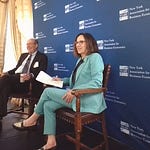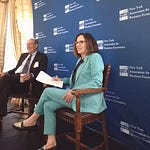Michael Boskin, noted Stanford University and Hoover Institution professor of economics, and former chair of the Council of Economic Advisors under George W. Bush, has put together a new book with a powerful message to all of us who may think the U.S. defense budget is plenty big enough to ward off any threats from actual and potential adversaries.
In “Defense Budgeting for a Safer World: The Experts Speak,” he warns that the U.S. has allowed its “military capability gap” to shrink at a time when its adversaries are doing whatever they can to catch up with and surpass the U.S. on this front, and the defense spending budget must be increased and updated to address this.
”Democracies usually underinvest in their militaries during peacetime, if history is any guide. And so, the great military advantage over potential adversaries we have enjoyed for decades is shrinking,” Boskin wrote in a recent Hoover website post where he talks about his book.
“Adversaries have been strengthening their military capabilities, often with sophisticated technology and directly focused on potential conflict with the United States. Our threat evaluation and strategy must be built on this unfortunate reality.”
He makes it clear, in the book, in this post, and in my interview with him that the defense budget must be increased - now.
”The defense budget provides the resources and authorities for the military to deter aggression and, if necessary, defeat aggressors. Its adequacy and composition reflect America’s priorities in dealing with threats to our national security, which are growing in potential severity and spreading throughout the world,” he added in his post. “Yet the defense budget has experienced wild fluctuations in recent years, from sequester starvation to sizable increases of uncertain duration.”
A couple of important points about the book. He put it together with two other experts in the field, John N. Radar, visiting fellow at Hoover, COO at Affinity Partners, and a former senior policy advisor to the National Security Council: and Kiran Sridhar, head of strategic initiatives for Resilience, and a member of the investment team at Shield Capital. There are articles by 34 contributors, among them Democrats and Republicans, covering the main topics in national security budgeting from different angles and not always agreeing with each other.
As I said to Professor Boskin in our interview, one of the things I like about this book is that you can consume it bites, one by one if you like as I often do when I have a book by my bedside that I can pick up for a quick read before I go to sleep.
When you read it, do start with the intro written by him and his co-authors. It sets the stage for all of the more specific that come after it, which then go on to give varying views on the topics that are on the table now as Congress takes up the defense budget again. And as defense spending may become a big issue at presidential debate at the end of this month, and the conventions this summer.
Now, as an apertif to the book, watch and listen to our interview.
BOSKIN COMPLETE BIO:
Michael J. Boskin is Tully M. Friedman Professor of Economics and Senior Fellow, Hoover Institution, Stanford University. He is also Research Associate, National Bureau of Economic Research. He served as Chairman of the President’s Council of Economic Advisers (CEA) from 1989 to 1993. The independent Council for Excellence in Government rated Dr. Boskin’s CEA one of the five most respected agencies (out of one hundred) in the federal government. He chaired the highly influential blue-ribbon Commission on the Consumer Price Index, whose report has transformed the way government statistical agencies around the world measure inflation, GDP and productivity.
Advisor to governments and businesses globally, Dr. Boskin also serves on several corporate and philanthropic boards of directors. He is frequently sought as a public speaker on the economic outlook and evolving trends significant to business, national and international economic policy and the intersection of economics and geopolitics.
He is internationally recognized for his research on world economic growth, tax and budget theory and policy, Social Security, U.S. saving and consumption patterns, and the implications of changing technology and demography on capital, labor, and product markets.













Share this post